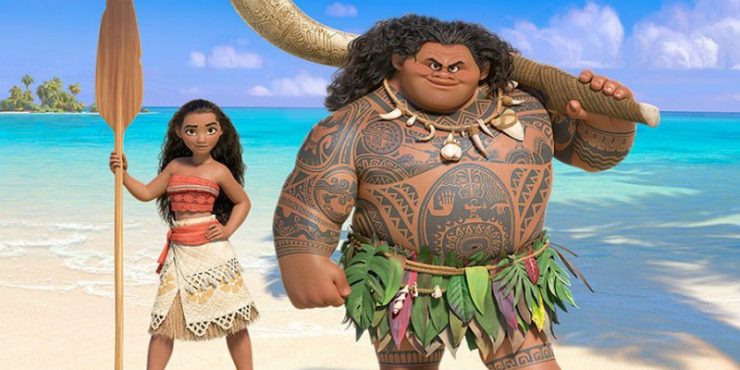Disney veterans Ron Clements and John Musker are masters at the kind of low-stakes sweet spot that most family films aim for. Their films are sweet, deceptively intelligent and filled with the kind of good-heartedness that has made Disney the monolithic empire that it is today. Films like Aladdin and The Little Mermaid are not challenging the way The Lion King or Beauty and the Beast is (to the degree that those films offer the audience an element of innate melancholy), they’re working toward a broader appeal. Their films help you come to grips with the kind of capitalistic relentlessness that the brand is aspiring toward. Moana is their first film since The Princess and the Frog, which was a curious film that underachieved in its attempt to win over an audience nostalgic over a more classical animation style. Moana is their first film in the Pixar-dimensional world. It shares a lot with recent Disney Animation films like Tangled and Frozen, but still captures that classical feeling. Moana doesn’t present anything challenging either, its just presents pleasantness.
That’s not to say that Moana isn’t original, it’s simply archetypal. It’s a princess movie where the princess at the center of the story declares herself “not a princess”. And she’s right, in a way. Moana Waialiki (Auli’i Cravalho) is the daughter of Tui Waialiki (Temuera Morrison), the chief of the island of Motunui. As the Tui’s only child, she will inherit her father’s responsibility over the island. She will not be an idle princess, but an active ruler. Tui preaches an isolationist culture for Motunui, forbidding anyone from sailing beyong the reef, especially Moana who has already shown a propensity for wandering beyond borders. She craves at adventures, is an inherent voyager, but does her best to please her father’s wishes. Moana’s grandmother Gramma Tala (Rachel House) encourages Moana’s seafaring interest. Tala tells a tall tale the prophecies Motunui’s demise. The story is of the demigod Maui, who stole the heart of the island of Te Fiti, a glowing green stone that has the power to create life. Intending to gift it to humans, Maui instead puts a curse over his people, a curse, Tala warns, will soon manifest itself on Motunui.
Tui doesn’t want Moana or anybody to give credence to Gramma Tala’s crazy stories, but when fish become scarce and Motunui’s coconuts begins to rot from the trees, Gramma Tala tells Moana what she must do: she must find Maui and implore him to return the stone to Te Fiti to bring the balance back to the world. Moana‘s adventure really takes off as the young explorer finds Maui (Dwyane Johnson) isolated on an island for the last millenia. Maui, gifted by the gods a powerful fishhook which allows him to change form to any creature, is not very interested in helping Moana in her quest. Often, the young girl is forced to sternly face the aloof Maui and, with a little help from the ocean that had chosen her for this quest, she eventually convinces the charismatic Maui to help her. As they head toward Te Fiti, they encounter impediments that (of course) bring forth both physical and emotional obstacles for the two characters to overcome.
The film’s screenplay (by Jared Bush, but with a whopping eight writers getting a story credit) has familiarities throughout, lacks any real suspense, and depends a bit too much on simplified character psychologies to craft its story. Clements and Musker end up using all of this to film’s advantage, though, as the chemistry of the voice performances end up being the true engine that makes the film run. What Moana’s hero’s journey lacks in surprise, it makes up for in general effectiveness. We don’t exactly want to see these characters experience any other fate. The film is filled with fantastic musical numbers and songs written by Lin-Manuel Miranda. “How Far I’ll Go”, Moana’s anthemic, reprised tune stands out, as well as “Shiny” a strange, delightful tune sang by a gluttonous coconut crab voiced by Jemaine Clement. Miranda’s music plays exceptionally with Moana and Maui’s adventure, and adds to the film’s overall sense of pleasantness. It’s no small thing that this is Disney’s first film about peloponnesian culture, and the script is Disney’s usual mashup of cultural mythology and standard Disney tropes, but it continues the studio’s trend to be more representative, more colorful. It helps that the film itself is exquisite.
Directed by Ron Clements and John Musker










